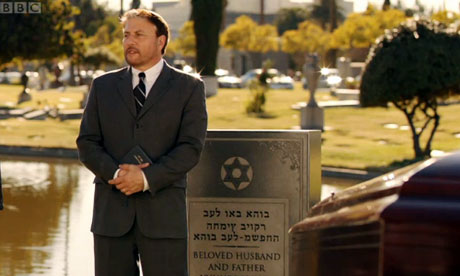Начало положено. Писать и хочется, и стеснительно. Поделюсь буквально парой впечатлений.
Сегодняшний день прожит не зря. Во-первых, очередное занятие на… курсах — громко сказано… в мастерской конференц-перевода прошло ударно — ребята явно входят во вкус и начинают понимать, зачем они здесь. А во-вторых, от коллеги прилетела вот такая статья.
Приведу полный текст и ссылочку дам.
How BBC comedy Episodes inadvertently went viral in Israel
The programme has become infamous after its makers mistranslated a gravestone inscription – with disastrous results.

Everyone in Israel is talking about the British-American BBC comedy Episodes. Not that it is airing there, but the show has recently become famous for its disastrous use of freebie online translation.
In episode three, Merc Lapidus, one of the lead characters, attends the funeral of his father. The episode was shown in the UK several weeks ago and is airing in the US later this summer.The gravestone, as per Jewish tradition, is bilingual – the local vernacular, in this case English, along with Hebrew. But the entire Hebrew inscription is written backwards, starting with the last letter and working back to the first. The reason, of course, is that Hebrew runs in the opposite direction from English, from right to left. And it gets worse. If you go to the trouble of reading the text, you’ll discover that the man commemorated, a certain Yuhudi Penzel, has been «pickled at great expense». This is what you get if you use Google Translate to render «dearly missed» into Hebrew. The blooper is now going viral in Israel.
Automated translation has its hazards, whatever the language. In January, Malaysia’s Defence Ministry rewrote its English website after relying on Google Translate and informing web users that the ministry’s dress code bans «clothes that poke eye» (revealing attire) and that Malaysia has worked to «increase the level of any national security threat.» But Hebrew, with a particularly high number of words with multiple meanings, and complex linguistic relationship between the ancient and modern language, poses particular problems. I recently bought a bottle of grape juice. Kosher laws require that fruit is only picked from a plant over four years old – pick it younger and the fruit is called orla and can’t be eaten. Seemingly an online translation threw up the more common meaning of orla: my bottle reassured me that I could drink it «without fear that it contains foreskin».

Любопытно. Про мастерскую можно и подробнее, ладно? А то я что-то не найду начало, а тут уже итоги 🙂
Про мастерскую мне и самой любопытно. Началось все на самом деле не так давно — в апреле. Весна, день дурака опять же 🙂 До этого я скромно переводила и убеждала всех, что этому не учат. Но уговаривали попробовать себя в роли преподавателя синхрона долго, и наконец я не выдержала — да и любопытно: а вдруг все-таки учат. Пришлось поднимать литературу, учить матчасть — и оказалось, что да. Так что мастерская — это пока тоже несколько громковато, но есть студенты, место для занятий и грандиозные планы.
Боже, даже создатели кино прибегают к гуглоперводу *facepalm*. Я еще могу понять, когда то делают в коммерческой переписке, ее всяко видят только двое — пишущий и читающий (за исключением эпических случаев, над которыми потешаетс интернет). Да в принципе в коммерческой переписке можно понять суть и с гуглопереводчиком. Но уж в кино-то!!!
Вик, ну несерьезно из-за пары слов искать переводчика. 😉
В самом деле. Чегой-то я, наивная!…
Не столько то удивительно, что кино, сколько то, что BBC.